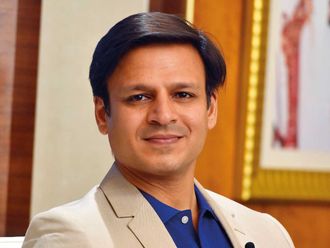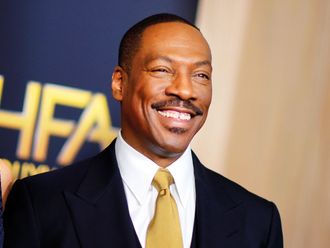The warmth of the tropics permeates the culture and cuisine of Ghana. And the culture flourishes even when transplanted to other shores, writes Shalaka Paradkar
Looking for a touch of Ghana in Dubai? Why, head to the Hotel Vienna, naturally!
To reach the hotel, alight at Deira's Al Sabkha abra station, pass the maze of shops opposite the Sabkha bus station until you come to a sliver of a building with Pakistani jooti shops on the ground floor. Board the rickety elevator and let your nose guide you to the savoury aromas of seafood stew and jollof rice wafting from the upper storeys.
Despite the name, there's nothing Viennese about the place - it's a happy, noisy chophouse (chop is pidgin for eat) presided over by the redoubtable Zienab Issah Darbre - or Madame Zinabu, as she is known. (Ghanaian etiquette demands women be addressed as Madame and, boy, does it make a woman feel like a queen!).
An impressive, 40-something Ghanaian lady who came to Dubai three years ago to work as a chef, Mme Zinabu dispenses comfort food and motherly advice in a functional setting, resonant with the musical cadences of several West African dialects.
Homely, no-frills Ghanaian food is what Zinabu does best; though, in a concession to her pan-African clientele, Ugandan and Nigerian delicacies also feature on the oral menu.
In a show of hospitality, she insists I taste her cooking and it's delicious: a whole tilapia broiled in a light sauce of ginger, tomatoes and chilli, served with a yellow pillow of fufu (yam, plantain or cassava porridge).
Before eating, I wash my hands in the tableside basin of water. Then I follow Zinabu's instructions on eating Ghanaian-style: pinch off a portion of fufu, roll it with your fingers and make an indent with the thumb. Presto! An edible spoon to scoop up the fish stew.
A neophyte palate might choke on the glue-like fufu ("Swallow it, don't try to eat it," Zinabu cautions) but the heart will surely glow after experiencing Ghanaian love and generosity. As we say our goodbyes, Zinabu offers to stitch me a traditional costume, a gift from a newfound friend.
Fellow Ghanaian expat Emil Akumah tells me how fufu is made.
"Making fufu is a laborious process. Pieces of boiled yam [or plantain or cassava] are tossed into a large mortar set on the ground. Two people, each with an oversized pestle as tall as themselves, stand on each side of the basin and pound it into a paste. All the while, cups of water are added and the yams turned into a thick gluey mass," he says.
"Fufu is served with a bowl of soup," Akumah says, adding that homesick Ghanaians stock up on fufu powder and stir it into hot water on a stove element.
Continuing our culinary education, Akumah describes a somewhat dubious delight.
"Another of our delicacies is the akrantie, or grasscutter: a rather fat four-kilo rodent of the savanna. The meat is just super delicious! Believe me, if you eat the food in Ghana you will never want to return," he says.
After this left-handed compliment to the cuisine, he describes kenke, another staple.
Eaten with pieces of fried fish or spicy shito sauce (made from chillies and dried shrimp), kenke is a boiled, fermented cornmeal ball wrapped in corn husk and served with sauce and accompaniments. This is then mixed and eaten by hand.
"It tastes like Mexican salsa; it's made from raw tomatoes, pepper and onions ground together," Akumah says.
Fathia, the Egyptian wife of Ghana's late ex-president, Kwame Nkrumah, loved Ghanaian food, even if it took her some time to adjust to the taste. Her favourite dishes were kontomre (spinach and smoked fish stew), yam cakes, fried plantains, kenke and the fragrant red palm-oil stews of fish, crab, prawn and snail.
Other foreigners, even unabashed Ghanaphiles, are often slower to be charmed. Dubai-based Dutch expatriate Vivian Veldstra, who lived for a year in Ghana's capital, Accra, says she tried groundnut soup occasionally but mostly stuck to the plentiful and readily available Lebanese food. Aside from the food, it was a happy time for her.
"The one thing you cannot forget about Ghana is its friendly and helpful people. They are always happy to make new friends and invite you into their homes," Veldstra says.
"Once we suffered a flat tyre on our way home from a weekend trip," she says. "Two boys suddenly appeared out of nowhere to rescue us. They ran to the next shop to get the tools, changed our tyre, smiled and wished us a safe trip home - without asking for anything in return!"
Travellers to Ghana speak with wonderment of complete strangers who invited them home to share a meal, or guided them when they were lost. There are also tales of Ghanaian hosts giving their guests anything that they admire.
American poet Maya Angelou, who lived in Ghana from 1962 to 1966, said it best: "While the rest of the world has been improving technology, Ghana has been improving the quality of man's humanity to man."
A bitter and painful history of slavery and colonialism over five centuries hasn't stamped that innate kindness out of the Ghanaian psyche.
Ghana is also a rare African nation in that the worst news in recent times was the failure of the beloved Black Stars football team at the 2006 African Cup of Nations. No famine, war or civil strife here. The cities may be dingy, but the people are radiant.
"Despite the fact that many people are struggling to eke out a living, there is always a party going on: whether it is fans celebrating the victory of their football team, or family and friends dancing at one of the many funerals," says Veldstra. (Ghanaians believe that when loved ones die, they move on to another life, hence death is celebrated with dancing, music and brightly-coloured coffins.)
While on the subject of funerals, here's something truly unique. In Ghana, coffins are often shaped as cars, cigarette cartons or mobile phones.
In fact, the Ga people of coastal Ghana celebrate the deceased person's life with an appropriate coffin - the late driver gets one shaped as a car, the chain smoker a cigarette packet and the fisherman a boat-shaped coffin.
Ghana deconstructed
Sitting in his office at Goltens ship repair firm, Emil Akumah quickly and impressively sketches a map of Africa that shows Ghana on the Gulf of Guinea, wedged between Côte d'Ivoire to the west, Burkina Faso to the north and Togo to the east.
"Ghana, like England, lies on the Greenwich meridien and is just a few degrees above the equator, so it's always wet and hot."
Akumah explains the geographic and ethnic divisions of Ghana, a country comprising 10 regions.
"There is savanna in the north, inhabited by the Mole-Dagbane. The south-central region, known as Ashanti, has dense rainforest and produces most of the country's cocoa, minerals and timber. The Akan people (of the Ashanti and Fante tribes) make up the majority of the population. The southeastern corner, where I hail from, is the Trans Volta region: home to the Ewe (pronounced 'abay') and the Ga-Adangbe."
The majority of Ghanaians (54 per cent) are Christian. Islam is practised by 13 per cent of the population, mostly in the northern region.
However, traditional customs are revered. Local chiefs are held in high esteem and still preside over their communities.
Zinabu recalls how her father, an Akan chief, had 13 biological children with his four wives. As a chief, he was also expected to look after abandoned children within the tribe, so Zinabu grew up with a modest-sized family of 22 siblings.
Akumah and Zinabu represent different ends of the spectrum in Ghana's burgeoning community in the UAE. After taking advantage of a government scholarship to study engineering in Germany, Akumah studied quality management in England, then came to Dubai to work.
In contrast, Zinabu struggled to find a job and feed herself in Ghana, but through sheer hard work she forged on, eventually securing work in Dubai. The UAE diaspora also includes a large floating community of traders who regularly visit Dubai.
Many Ghanaians prefer to emigrate and remit funds, almost $2 billion (about Dh7.36 billion) annually, to help their families at home.
Expatriates in the UAE stay in touch through phone calls, internet groups and regular community meetings. One vital focus is the informal community group, Ghana Community in the UAE.
The group's president, Davidson Rich-Agoe, says they petitioned President John Kufuor last year to establish an embassy so as to facilitate trade between Ghana and the UAE. The need for an embassy, he says, was also felt to uphold the fair name of the community in the UAE.
"[In our group] we have Ghanaians who have been coming to Dubai since 1979. There are now about 80 Ghanaian expats who are part of the community in Dubai, Sharjah and Abu Dhabi," he says.
"Ghana's president is also chairman of the Economic Community of West African States (ECOWAS), a regional economic organisation catering to 250 million people in West Africa. ECOWAS allows for the free movement of goods and people across the borders of its 16-member nations," Davidson adds.
"While this is progressive, it has also created the problem of Ghanaian passports being bought by nationals from other West African countries [with] criminal intent, creating an image problem for genuine Ghanaians abroad."
Tracing a painful past
A more painful history ties Ghanaians to African-Americans. Millions of African-Americans make the pilgrimage to Ghana annually to re-acquaint themselves with their ancestry.
Dotted along Ghana's coast are castles where slaves were held before their journey to the New World. While Americans are traumatised by the sight of these former prisons, for most Ghanaians the castles are simply relics of the past.
"That area was known as the Gold Coast because Europeans knew it as a source of gold," Akumah says. "The Portuguese, the first Europeans to arrive and trade in gold, ivory and pepper, built their fortified settlements on the western coast. They named it Elmina (the mine) after the many gold mines in the region."
Several European powers struggled to gain control of the lucrative slave trade and gold mines in the region. The Portuguese lost Elmina to the Dutch in 1642, then pulled out of the Gold Coast.
Over the next 150 years, Holland, Denmark and Britain fought for control, erecting fortified settlements to protect their stakes in the mineral-rich land from each other and the African tribes.
In 1821, Britain took control of Ghana's major ports and the region gradually became a British colony.
Ghana gained independence on March 6, 1957, becoming the first sub-Saharan African colony to do so. Kwame Nkrumah became the country's first prime minister and later its president.
One of Africa's most charismatic leaders, Nkrumah studied in the US and England, then returned to Ghana in 1947, where he agitated for independence.
Africa's first black national leader championed Pan-Africanism, but when his rule verged on dictatorship, he was overthrown in a coup. Ghana went through turmoil under a succession of dictators before democracy returned.
Since 1992, it has held elections every four years. In 2001, John Kufuor was elected president and in 2004 he was returned to office.
President Kufuor's most famous quip was made in response to a BBC journalist's charge against him of being boring.
"If boredom gives us peace and stability for people to go about their normal businesses and live in dignity," he said, "then I would say, let's have more boredom."












